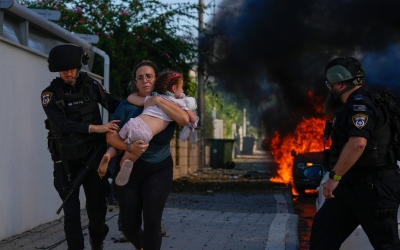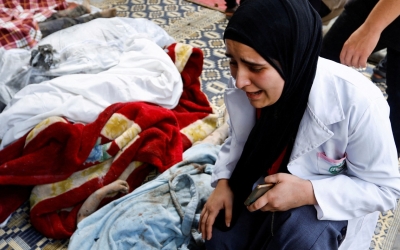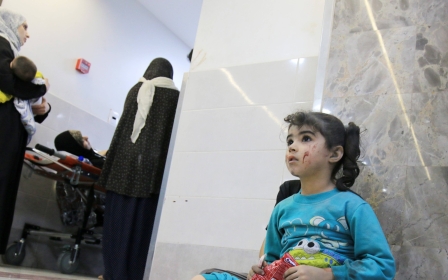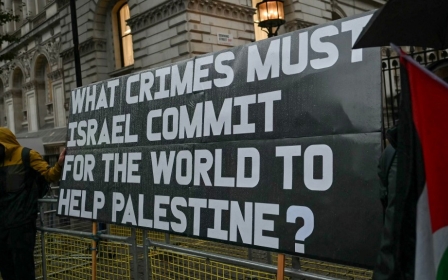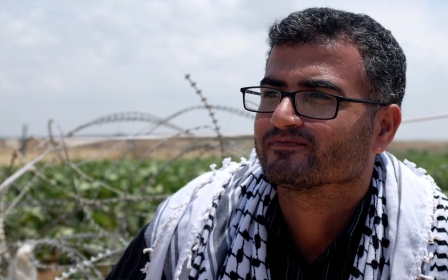'Under the red sky': A mother's failed attempt to seek shelter from Israeli bombs
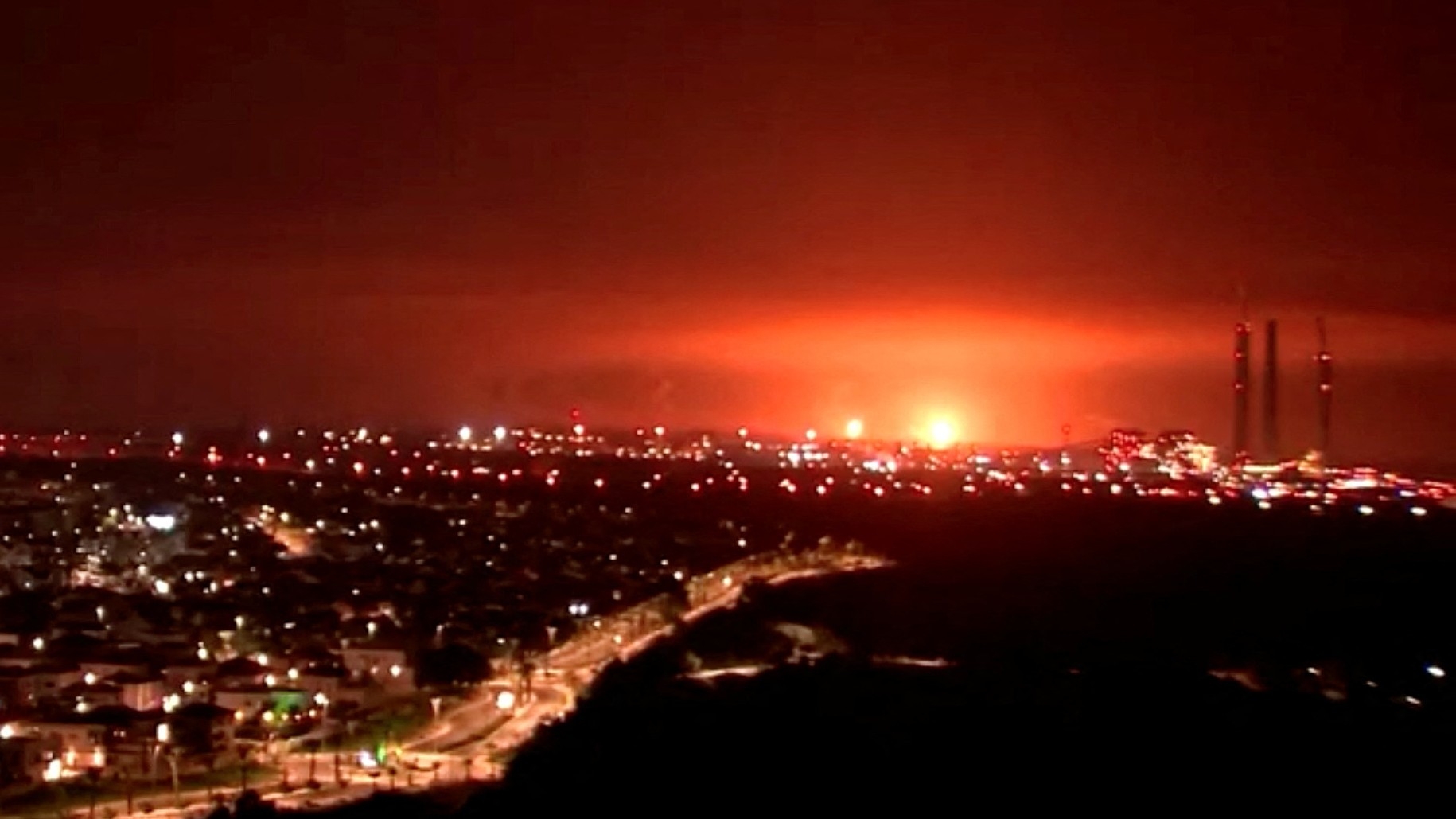
Tasneem Awni and her sisters-in-law were cooking dinner on Friday, 13 October, when Israeli planes dropped leaflets ordering 1.1 million residents of northern Gaza to evacuate south. "Gaza City now is a battlefield," the leaflets read.
In a whirlwind of panic, she and her extended family, who reside together in an asbestos-clad house in Gaza, hastily gathered their essential possessions, modest savings, and a few items of clothing.
"As we departed, my children and I shed tears. It was at that moment I realised that my home was the most precious thing I possessed, second only to my daughters," she told Middle East Eye.
With more than 12 family members, including her disabled mother-in-law in her 60s, the challenge of fitting into a small car and setting it in motion remains a blur to Tasneem. "My children were terrified as the thunderous bombardments continued," she said.
The journey southward unfolded as a nightmarish odyssey, according to the mother of three.
New MEE newsletter: Jerusalem Dispatch
Sign up to get the latest insights and analysis on Israel-Palestine, alongside Turkey Unpacked and other MEE newsletters
Tens of thousands of displaced people filled the streets, most of which were marked by bomb craters. Many individuals were seen on donkey-drawn carts, laden with sacks of flour and gas cylinders.
"I witnessed a new mother cradling her infant with one hand and protecting her pregnant belly with the other, all while walking with her children. It was a haunting sight," she said.
Although the journey itself took a mere 15 minutes, the ceaseless fear made it seem like an agonising passage of days.
Follow Middle East Eye's live coverage for the latest on the Israel-Palestine war
They sought shelter in their relative's apartment in al-Zahra City, in central Gaza, where the intensity of bombing was slightly less than in other areas.
Since Israel cut off electricity, fuel, water, and humanitarian aid to Gaza in the aftermath of the 7 October attack, Tasneem's husband, Ahmed, 35, and his brother had been making perilous trips into Gaza to buy fuel from a local petrol station. They needed this fuel to power a generator, which, in turn, allowed them to extract water from a nearby well.
The second evacuation
However, their supposed refuge turned out to be far from safe.
On the morning of 19 October, panic once again gripped them as Israel launched an air strike targeting two towers in al-Zahra City.
"My brother-in-law warned me that, if Israel targeted one tower in the city, it would likely extend its attacks to all the towers. It's like a malignant cancer, spreading rapidly," said 32-year-old Tasneem.
Around 7pm, Israel issued a warning to all residents in al-Zahra to evacuate the area before launching an attack on another 22 towers.
'We were on the streets, with our children, and there was no shelter to seek refuge in'
- Tasneem, mother of three
In a frantic rush, they gathered their belongings, clothes and blankets.
The real struggle began when they had to carry Tasneem's disabled mother-in-law down the stairs.
Thousands of people crowded the streets, desperate to escape the impending danger.
The civil defence authorities advised them to assemble near a government school, cautioning against congregating inside it to avoid a fate similar to that of al-Ahli Arab Hospital.
They huddled against the school's walls. The streets, aside from the unsettling barking of dogs, were eerily devoid of any signs of life or movement.
Then, the sky began to glow with a fiery red hue, and this was followed by an ear-splitting barrage of explosions.
"It was a sound that defied description, the loudest and most unbearable noise I had ever heard," Tasneem said.
This cycle repeated itself almost every 15 minutes, persisting from night until morning, she said.
"Every 15 minutes, we were left in tears, crying out in fear and desperation, unable to comprehend the relentless bombing that was occurring just a few hundred metres away from us. We were on the streets, with our children, and there was no shelter to seek refuge in.
"To make matters worse, at 3am, the cold began to set in, and we weren't dressed warmly, intensifying our suffering. That night was, without a doubt, the worst night of my life. No words can truly capture the horror we experienced; it was beyond description."
The following morning, the extended family, miraculously having survived, faced a difficult choice: return to their home in Gaza or seek refuge in one of the schools run by the UN agency Unrwa, where hundreds of thousands people already sheltered. They ultimately chose to return home.
According to the UN's Office for the Coordination of Humanitarian Affairs, the hostilities have left more than 1.4 million Gazans displaced, including 640,000 sheltering in 150 Unrwa buildings across the Gaza Strip and 121,750 sheltering in hospitals, churches and other public buildings.
"Nine of us managed to return by car, while the rest of our family had to walk approximately 10 kilometres, as there were no taxis available,” Tasneem said.
"Back in my house, we face the harsh reality of having no electricity or water. I rely on my neighbour, who has a small well, to provide me with a limited amount of water. Unfortunately, the water is extremely salty, given the proximity of the well to the sea.
"Finding potable water and adequate food has become a daily struggle. My cooking options are limited, typically to pasta and canned goods like lentils and beans, which are available at local groceries. I consider myself fortunate to have a gas cylinder for cooking, especially when I see my neighbours resorting to open fires to prepare their meals," Tasneem said.
Impact on war-stricken children
The devastating toll of the bloodiest Israeli-Palestinian armed conflict, so far claiming 7,326 Palestinian lives, including 3,038 Gazan children, and 1,400 Israelis, has left an indelible mark on the impoverished Gaza Strip, particularly on its young.
Numerous reports have shed light on the deep trauma afflicting the children of Gaza. In 2021, the Euro-Med Monitor for Human Rights revealed that more than 90 percent of children in Gaza had experienced some form of post-traumatic stress disorder due to the repeated Israeli assaults on the region.
"My children now are scared to even go to the toilet alone. When they hear the bombings, they rush to hide behind me or my husband, or they sit on the ground, fingers pressed to their ears, trying to drown out the sound of the explosions. They've become hyperactive, constantly bored, and ask me to play children's cartoons, but we don't have electricity to do so," Tasneem said.
Yaser Abu Jame, a senior psychiatrist and director of the Gaza Mental Health Programme, noted that children manifest symptoms of trauma in various ways, such as refusing to eat or drink milk, failing to thrive, displaying hyperactivity, struggling with concentration, experiencing nightmares, clinging to their mothers, bedwetting, and complaining of pain in their knees or abdomen.
"It is imperative to put an end to the events that have sown insecurity and fear. A ceasefire and halting all bombardments is the first step, after which we can provide the necessary interventions and assistance," said Abu Jame. His programme's teams are active in the field and operate 12 free hotlines for mental health services.
He also emphasised that the fear of infectious diseases, stemming from inadequate hygiene and poor sanitation conditions among displaced people in Unrwa schools, exacerbates the challenges faced by children in coping with their dire circumstances. This heightened concern among parents about their children's health adds to the overall distress.
"The demand for mental health services typically surges dramatically two weeks after a ceasefire because people are primarily preoccupied with ensuring their physical safety, finding shelter, and providing their family members with essential necessities like food and water," the senior psychiatrist said.
Middle East Eye delivers independent and unrivalled coverage and analysis of the Middle East, North Africa and beyond. To learn more about republishing this content and the associated fees, please fill out this form. More about MEE can be found here.


